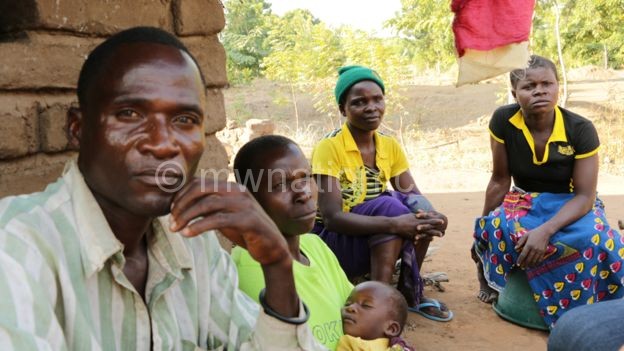Mutharika faulted on ‘hyena’ arrest
President Peter Mutharika has come under fire over suspected abuse of power following his order for the arrest of the Nsanje man who confessed to defiling young girls and sleeping with widows when he was HIV positive.
Edge Kanyongolo, a constitutional law expert and associate professor of law at Chancellor College, a constituent college of the University of Malawi (Unima), yesterday questioned the powers the President used.

But Attorney General Kalekeni Kaphale last evening defended the presidential directive, arguing that powers to arrest rest with the Executive, police and the Anti-Corruption Bureau (ACB) which the President heads.
Kanyongolo argued that the President should not be instructing bodies such as the Malawi Police Service (MPS) to make arrests because they are operationally independent.
According to Chapter 15 of the Constitution, specifically Section 161, the police is independent of the Executive.
Reads Section 161 (1) of the Constitution: “The Malawi Police Force shall be an independent organ of the Executive, which shall be there to provide for the protection of public safety and the rights of persons in Malawi according to the prescriptions of this Constitution and any other law.”
Section 89 (1) of the Constitution, which outlines powers of the President, does not state that he/she has powers to order arrests.
However, the Police Act or Chapter 15 of the Constitution does not give the President such powers.
But in a statement issued on Monday ahead of the arrest of Eric Aniva, the State House Press Office stated that the President had ordered Aniva’s arrest and subsequent investigation to be followed by his prosecution for the acts.
“Specific to the Nsanje reported incident of a Mr. Eric Aniva who appeared in the media apparently confessing that he is hired to sleep with young girls, as the Malawi leader and commander-in-chief of the Malawi Police Service, the President has directed the police to immediately arrest Mr. Eric Aniva, investigate him and take him to court forthwith for the defilement cases which he apparently confesses to,” reads the statement signed by presidential press secretary Mgeme Kalirani.
But in an interview yesterday, Kanyongolo said the general principle is that the President should not stand on a podium to give instructions to any government agency.
He said: “Government agencies should be allowed to exist independent of the President. The President should resist from the temptation to issue orders to independent organs of the government.”
Kanyongolo maintained that institutions which should be operationally independent should remain so.
He said: “Structurally, it [police] might not be independent, but the decision of who to arrest, who to grant bail and who to throw teargas at, the police should make such decisions themselves.”
Kanyongolo also raised the argument of selective application of laws of the land, specifically harmful practices which have existed and impinge on the rights of women and children contrary to legislations such as Gender Equality Act and Child Care, Protection and Justice Act.
He said the President, having mentioned these specific legislations, should have instituted comprehensive action.
Kanyongolo emphasised that all harmful practices should be eliminated and if the government wanted to use criminal law, it should be done comprehensively.
He said: “Let’s go on an exercise to eliminate all of them [harmful cultural practices]. What has happened could amount to selective prosecution. Let’s attack kusasa fumbi and all of them than just focusing on one thing just because BBC [British Broadcasting Corporation] has covered it.”
In addition to the directive to arrest Aniva, the President, according to the statement, also directed the police, the district commissioner (DC) and traditional leaders in Nsanje to investigate all men and parents involved in what it termed “shocking” malpractice.
In an interview yesterday, Kaphale said the President acted because he may have noticed that the act was criminal, but the Police may not know about it.
“The President can put up a view or voice an opinion that this is criminal conduct. I don’t see anything wrong for the President to see that a criminal act has occurred. The reactions out there are born out of the failure to see the linkage between police powers which are Executive powers and presidential powers which are also Executive,” he said.
However, when put to him that the Constitution and Police Act do not give the President such powers, Kaphale said he was not sure if the police acted because the President directed or the Inspector General could “never ever” have acted without it.
He did not dispute the illegality of the alleged actions by Aniva because 12-year-old girls could not given consent to the sexual acts, as such, Aniva could face defilement charges.
Last Thursday, an article featuring Aniva and published on BBC went viral on social media. In the article, Aniva, who has got two wives and five children, claimed he is paid from $4 (about K2 900) to $7 (about K5 075) each time he performs his fisi [hyena] duties.






I was lead to believe that APM is a Law professor………which law school did he go to and why does he keep committing these school boy errors? Does he have advisers at all? This is really embarrassing for the big Kahuna, a president should not be driven by emotions leave the police to do their job professionally.
It must also be pointed out that our police leaves a lot to be desired………….always known for the bad reasons…………police brutality, HIV infested, corruption, politically motivated, booty lickers and cowards……
Malawi is an embarrassment to the commonwealth. We are the only English speaking country with a very jumbled and disorganised governance system. The only country where the constitution is just a book and interpreted which ever way one thinks.